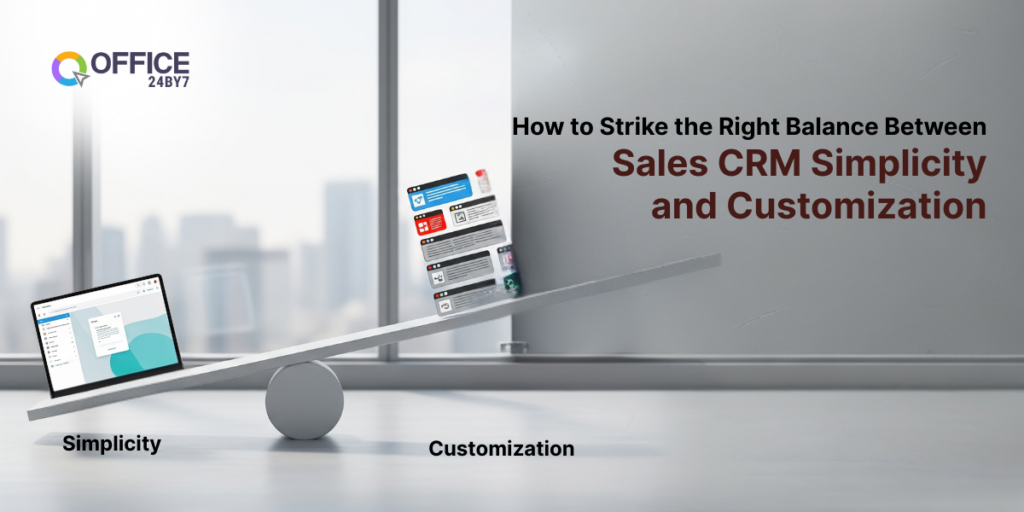Not sure if this blog on Sales CRM contains quality information?
Try our 1-minute short audio summary to decide. 🎧

To choose a good Sales CRM, you cannot decide between the biggest feature-set platform and a minimalistic one. In turn, it should strike a balance. If a CRM is too basic, it limits growth. When it is too complex, it is not adopted, and your investment becomes less worthwhile.
Simplicity makes a CRM easy to use. Customization ensures it meets your unique needs. The two are balanced to bring in a tool that spurs adoption, efficiency, and measurable business growth.
Balancing Sales CRM Simplicity with the Right Level of Customization
Finding the perfect balance of mix of simplicity and custom. As a result, functionality is what makes your Sales CRM a lasting success. Learn when to be simple and when to have customization to generate value to make a system that fits well with your team. As a result, it aligns with your team’s needs.
Why Sales CRM Simplicity Is a Competitive Advantage
A simple CRM removes unnecessary friction from daily operations. Once it is simple to navigate through the system, sales units do not have to worry about knowing how to operate the software. As a result, they can simply sell.
The advantage of high usability is the reduced time of onboarding, reduced training expenses, and improved data quality. It also makes adoption organization-wide, thus your CRM will be a source of truth.
Simple CRMs can be further enhanced by integrations such as Cloud Telephony services. Additionally, teams can handle calls and customer data all in one location.
When Sales CRM Customization Becomes Essential
Simplicity is good, but each business has its own workflow and reporting requirements. This is where customization becomes valuable. The general subject of flexibility means adjusting your CRM to preferred processes instead of adapting those processes to the software. Therefore, it provides better efficiency.
The custom fields, automated workflow, and custom dashboard can also be adjusted to your operations. An example is click-to-call software, which enables sales staff to make calls easily, directly on the CRM, recording every contact.
With Office24by7, customization goes beyond basic tweaks. Their dynamic objects capability allows businesses to build completely new CRM modules that suit specific processes. Therefore, it works for Lead Management, Task Management, or Ticketing Management. You can rename objects and add your fields. Moreover, you can automate actions to suit your specific sales cycle. This degree of adaptability means you can tailor the CRM to match your current operations. Additionally, it guarantees higher adoption and measurable productivity gains.
Steps to Achieve the Right Sales CRM Balance
The first step toward finding the right balance of simplicity and customization is clear. Additionally, you must understand how your team works and what matters most to them. A CRM should be easy to adopt. Therefore, it must also be dynamic enough to evolve with your business needs.
This is where features like dynamic objects become game-changers. They do not require tying you to predefined modules. In turn, they let you create brand-new data structures and workflows that truly reflect your processes. This balance can be adjusted by custom fields, automated triggers, and a custom reporting dashboard. Simplifying what the user sees without losing important tracking details helps the CRM serve sales representatives on the ground. Additionally, it helps executives monitor performance indicators.
When your team feels more comfortable, you can introduce advanced features like voice broadcasting services. Additionally, these features support outbound campaigns.
Listening to User Feedback through Sales CRM
The experience of your team with the CRM will indicate what is and what is not. Feedback sessions done regularly will help identify any inefficiencies and scope for improvement.
Feedback-driven customization transforms your CRM into a helpful application. As a result, it supports workflows instead of disrupting them. One example is adding a Virtual Number to trace incoming calls. Moreover, it lets you analyze which marketing channels perform better without adding complexity.
Why Office24by7 Delivers the Perfect Balance
The CRM offered by Office24by7 is both user-friendly and customizable. Therefore, it is easy to adopt and powerful enough for complex workflows.
The communication tools are embedded into the platform. This way, you avoid using several third-party tools. You can create custom modules and define relationships between them. Additionally, you can see data flows with little coding effort. You can make the interface simple for everyday users. Moreover, the backend remains powerful enough for heavy tasks. For example, the CRM includes Call Center Solution capabilities. Therefore, sales and support teams can manage calls, customer records, and follow-ups in one system.
The platform is scalable, so you can start with basic features. Additionally, you can add complex ones as your business grows. When you are ready to expand outreach, you can activate tools like SMS broadcasting. Moreover, these tools deliver real, measurable benefits.
The Long-Term Impact of the Right Sales CRM Setup
When you balance it properly initially, the long-term effects are tremendous. Teams work quickly without unnecessary features slowing them down. Additionally, leaders gain better insights from a CRM tailored to their needs.
Dynamic customization ensures your CRM works for current needs. Furthermore, it grows alongside your business. For example, start with basic contact and deal management. Later, you can add workflows to manage partners, inventory, or project milestones within the same system.
This adaptability future-proofs your investment. When new needs arise, you increase functionality while keeping a consistent and uninterrupted user experience. You can raise deal values with strategic improvements like Up/Cross-selling automation. Additionally, this has no negative effect on current operations. In the long run, this strategy boosts productivity. Moreover, it ensures maximum return on your investment.
Conclusion – The Business Case for Balance
Both extremes can reduce the value of your CRM. A CRM that’s too basic will limit growth. One that’s too complex will limit usage. The goal is to have a system that is easy to adopt. Additionally, it should evolve with your business.
Successful rollouts begin with simple features. Over time, you can add more complex tools as needed. For example, adding Missed Call tracking can improve how you follow up with leads. This addition keeps the user experience straightforward. By keeping things simple, customizing with intention, and listening to your team, you can turn your CRM into one of your most valuable business tools.
Office24by7 offers the right mix of ease of use and adaptability for your business needs. Therefore, it supports growth and delivers measurable returns. Call us at +91-7097171717 or email sales@office24by7.com and transform your growth strategy today!





